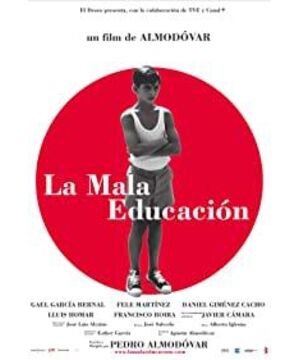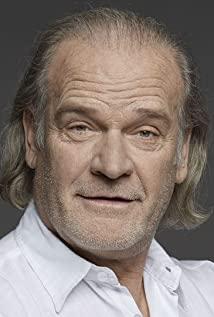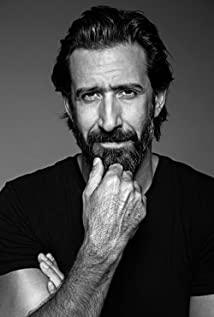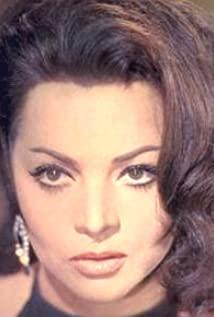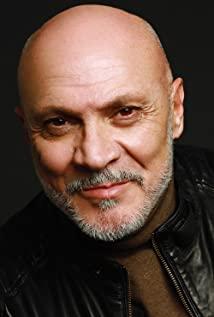There has never been a gay movie that made me think so long after watching it that I couldn't bear to turn off the video, but re-watch it and appreciate the beauty of the details of the film, the ingenious conception, and the montages that seem to be chaotic but not chaotic. In fact, when I first watched the film, I didn't think it should be an excellent film. It wasn't until I watched it in the fog and pondered other people's comments that I decided to revisit it. The second time, it should not be a complete presentation of the rush and pursuit of the first; the second time should be a reflection on the respective fates of Enrique, Ignacio, Juan, and the priest, and the comparison between Zahana in the script and Ignacio in reality. There is a lot of beauty that I want to talk about but always don’t know where to start. Maybe this ending is not what I wanted, but what is it? Life is inherently impermanent, not to mention that there is always pure love there, no matter what excuses can't cover up the most beautiful wound.I think I need to clarify the plot so that I can better explain my understanding of the film.
The story revolves around Enrique, Ignacio, and a gay-cum-pedophile priest who already had a gay relationship. The priest very much appreciates Ignacio's singing voice, which can reach the sound of nature like a nightingale. While appreciating, he also has a good impression of Ignacio, of the same sex. Enrique and Ignacio are students at a missionary school. They fell in love with each other, but this sweet and hazy relationship did not last long. One night, the priest found that his two students, Enrique and Ignacio, were not in their respective beds nor in the toilet. The two huddled together in the same room. The priest had no intention of punishing Ignacio and promised that Ignacio would equally forgive Enrique if he would do anything for him. However, the despicable priest used Enrique as a bait to take Ignacio privately, and he did not forgive Enrique but drove him out of the church school. The lovers were separated, and this was also the beginning of the separation of Enrique and Ignacio. From then on, the two started their own lives, and it was not until a fateful meeting that the secrets of many years were unfolded.
Enrique has had a successful career as an independent production director after parochial school. One day, when he and his assistant Martin were discussing the film material in the studio, a young man who claimed to be Ignacio came to the door. Martin thought it was an ordinary agent or the media who came to invite or interview him and wanted to send him away. The young man said he had seen Enrique sitting in the back room and insisted on seeing him. When Enrique stood up and saw Ignacio, he couldn't believe his eyes. 16 years later, he still met Ignacio. But the Ignacio in front of him is no longer the pure Ignacio of the original church school. He has a thick beard, talks eloquently, and has changed his name to Angel. He handed over his work "Traveler" to director Enrique, and hoped to play the leading actor in the script—Zahana as his actor. The prototype of Zahana is Ignacio himself. The part in the mission school is written according to the facts that actually happened, and the life after that is conceived by the author himself. But in fact, before that, Ignacio had died and left his legacy. Enrique went to his home to investigate and confirmed that Ignacio was indeed dead. But who is the renamed Ignacio in front of him? Enrique didn't debunk it right away.
The Script "Traveler": Zahara in the script was violated by the priest in the mission school, which made him no longer believe in God. Zahara, who lost his love and faith, quickly degenerated. He seduced men in nightclubs to defraud property, take drugs, and cross-dress. He is addicted, his life degenerates, and he dreams of becoming a woman. He seduced Enrique after a performance. He hadn't seen him for many years, so he didn't know that it was his lover from many years ago who had sex with him in bed. He didn't know what it was until he opened Enrique's purse and saw his ID card. True personal love He has long been unable to control his desires and has had a relationship with Enrique, who is unconscious of alcohol. Originally, Zahara had always done this kind of deed, cheating a man and stealing the money while he was asleep, but this time he didn't steal any money. He even gave him more money because he didn't have much on him. He wrote a letter to Enrique, telling him about his identity and leaving a kiss on the letter, quietly placed on Enrique's pillow.Zahara had been violated by a priest before, and for money he found the priest and extorted money from him. If the priest doesn't give him the money, he will write articles for the publishing house to smear his reputation. Of course, the priest didn't want to lose himself, and he and his accomplices plotted to kill Zahara. However, this is just a plot conceived by the author. How did Zahara die in real life?He has fallen for the transvestite who seduces men in nightclubs. —Zahara. This is his own description of himself. He has lost faith and love. The expression is more sophisticated and arrogant, but still true.
Yes, Ignacio, it is just as he describes it. He got caught on the wrong side of the law and will do anything for money. Of course, his supposed flame of love with Enrique was just wishful thinking, until one of his phone calls changed everything. This call was made by Ignacio to a priest who had already changed his career in book publishing. He threatened the priest with money if he did not want his family and superiors to know that he had had an affair with him. At that time, Ignacio was already transgender, and his huge breasts made him look very sexy. The priest came to his room, saw his younger brother Juan, and fell madly in love with his younger brother. He was willing to give Ignacio money because then he would have a reason to go to his house to meet Juan. Juan's family was poor and often lacked money. The priest gave Juan a lot of money, bought him gifts, and got Juan's body. Juan also hopes to change his poverty situation and is willing to have a relationship with the priest. One day, Ignacio's family called and said that my grandmother's pension had been stolen by Ignacio. At this time, Juan hated his brother to the extreme. In addition to taking drugs and being transgender, he had created huge social pressure. The priest was the mastermind, and Juan participated in the killing of Ignacio. A plan was born. At that time, Ignacio had already started rehab and promised to give up drugs for the last time and get on the right track. The younger brother and the priest, however, felt no guilt for their actions and bought large doses of heroin, enough to kill Ignacio shortly after taking it. Ignacio was killed by his priest and younger brother in the darkness before dawn, with his unfinished novel "The Traveler" and a sentence typed on his deathbed-"Dear Enrique, I think I succeeded"...
At galloping speed, Ignacio died at the hands of his priest and younger brother, and he didn't even understand why and by whom he died. Just when he thought he was about to start a normal life, he was strangled in the cradle of hope. He has never lived a lowly life, and his corrupt and depraved life comes from the sexual assault of the priest, from the distortion of credit, and from the cruelty of beating Mandarin ducks. This is something he can't change. He may only have to change himself. You can say that his willpower is weak and he is willing to fall, but losing his faith means a change in values. There is no holy God to believe in. The messenger of God, the priest, has shown him a filthy heart. Why should he pursue a faith that is holy on the outside and dirty on the inside? Of course, that is a belief in God, but it is against the heart. The life he chooses is to obey his heart. At least he is not hypocritical. At the beginning of the film, Enrique read a piece of news: the motorcycle owner flew 200 kilometers after his death, and two policemen escorted him! It seems to have nothing to do with the film, but in fact, it must be a metaphor for the director. Is Ignacio also like a motorcycle owner, his true love, dashing away from all obstacles and also through the escort of the virtual audience in Enrique's "Traveler" and the audience in the real world, to reach Enrique's heart?
Enrique knew about Ignacio's death from the beginning, but did not reveal the fake Ignacio. because they "just wanted to see how far you could go." Ignacio's younger brother, Juan, and Enrique don't want to use him because he can't accept this person who doesn't match Ignacio's image as his first love, and he doesn't know how much Ignacio has changed over the years, although he is indeed a good actor. However, Enrique finally uses actor Angel to play Ignacio. He knew that the actor in front of him had deceived him. Maybe he was a smart director. He knew how to make the most rational use of resources. Since someone came to provide the script and was willing to play the role, and since someone is an excellent actor, what can a lie represent? He must have thought about this question: instead of exposing the lies, the smart choice should let him continue to act. How far can the cheating in reality go? Where is the truth of the matter?
The priest told him everything; fantasy and reality collided. Although Ignacio would inevitably die in the end, Enrique knew the fact that he had died when he wrote the script, so he changed it to be so "pathetic and dark." In fact, Enrique did not. Ignacio's death was related to the priest and the younger brother, and this was something he would not have expected. When he learned the truth, his relationship with Angel became a rigid contractual relationship between the director and the actor. The angel standing at the door was the murderer of his first love. At that time, Enrique didn't show too much expression; he just coldly asked him to return the keys, get his luggage, and help him call a taxi so that he could leave quickly. Yes, he, who knew about Ignacio's death from the beginning, was waiting for the good drama to start. After the virtual drama ended, the truth was revealed, and the real drama was about to end. However, at this moment, in the face of Angel's sophistry, and believing that Enrique was in extreme pain, he must have wanted to kill him with his own hands. What could be more painful than a murderer standing in front of him without any guilt? No need to say anything more.
"Dear Enrique, I think I've made it": Ignacio's last words are unforgettable after his death. What has he succeeded in? Do you want to get off drugs and back on track; do you believe you've arrived and deserve to be yourself; or do you insist on your true love from start to finish and without regrets? Maybe it's not important anymore, but the suspense and thought-provoking handwriting that the director wanted to leave did add a lot of mysterious aesthetic color to the film. It is undeniable that the director limited the situation in which Enrique read this passage. He did not want the culprit to see his expression. In fact, he did not show the audience Enrique's expression. However, in his heart, he would be excited. How big the storm will be can only be imagined by the audience themselves. Undoubtedly, it leaves room for the audience's imagination, which makes people have endless aftertastes.
Film structure: The film uses a flashback method. First, Enrique meets the fake Ignacio in the studio, and the director changes the script to show the plots in the script one by one and successively intersperses the bits and pieces of Enrique and Ignacio in the church school, in real life, and in virtual reality. The plots of the script are alternated. Although it makes people feel dizzy, it is very multi-layered. The audience needs to automatically sort out the relationship between the characters, time, and place to better grasp the plot and understand the plot. Art is all fictional and beautiful, and reality is often more cruel and more utilitarian. After reading it, I don’t know what imprints are left in the depths of my mind, but there is always a little pain, and it will touch your heart from time to time.
View more about Bad Education reviews


